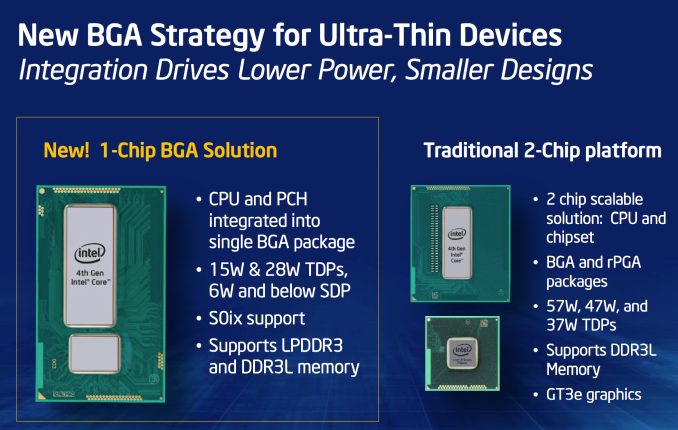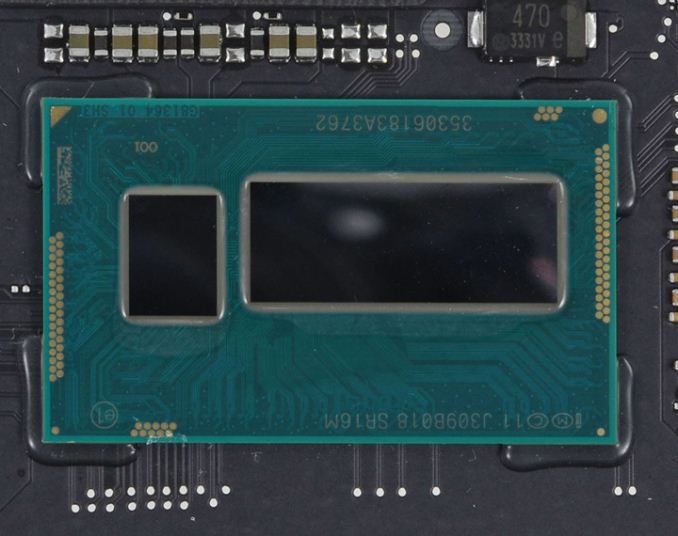The 2013 MacBook Air Review (13-inch)
by Anand Lal Shimpi on June 24, 2013 12:01 AM ESTThe CPUs
Apple keeps things simple across the 2013 MacBook Air lineup by configuring both 11 and 13-inch models with the same base CPU: a Core i5-4250U.
To understand Apple’s CPU choice, you have to understand that Apple is primarily concerned about improving battery life this generation. The line between MacBook Air and MacBook Pro has to be well defined. The Air is about portability, while the Pro is about performance. When faced with a power/performance tradeoff, it’s clear on which side of the fence Apple will fall whenever the MacBook Air is concerned.
| Apple 2013 MacBook Air CPU Comparison | |||||
| 1.3GHz dual-core | 1.7GHz dual-core | ||||
| Standard On | 11 & 13-inch MBA | Optional on Both | |||
| Intel Model | Core i5-4250U | Core i7-4650U | |||
| Base Clock Speed | 1.3GHz | 1.7GHz | |||
| Max SC Turbo | 2.6GHz | 3.3GHz | |||
| Max DC Turbo | 2.3GHz | 2.9GHz | |||
| L3 Cache | 3MB | 4MB | |||
| TSX-NI | No | Yes | |||
| TXT | No | Yes | |||
| AES-NI | Yes | Yes | |||
| VT-x/VT-x EPT | Yes | Yes | |||
| VT-d | Yes | Yes | |||
| TDP | 15W | 15W | |||
| Processor Graphics | Intel HD 5000 | Intel HD 5000 | |||
| GPU Clock (Base/Max) | 200/1000MHz | 200/1100MHz | |||
The lower base clock alone shouldn’t mean much, but the max TDP of the CPUs in the new MacBook Air falls as well - from 17W down to 15W. The thermal limit is even more dramatic since with Haswell ULT, the 15W includes the CPU/GPU as well as the on-package PCH. In Ivy Bridge the PCH was off package and wasn’t included in the 17W TDP.
Max turbo clocks are identical between the Haswell ULT CPUs Apple picked this round and the Ivy Bridge models before, but with a lower TDP it’ll be harder to always sustain the same frequencies given the right workload.
Haswell does feature a not insignificant gain in IPC compared to Ivy Bridge, which should help offset the power constraints that could otherwise force a larger regression in performance.
Both 2013 MBAs ship with the same CPU by default, and both can be upgraded to the same higher end SKU: a Core i7-4650U. The 4650U retains the same 15W TDP as the i5-4250U, but it increases its base clock speed to 1.7GHz and max turbo to 3.3GHz. The L3 cache also grows from 3MB to 4MB. All in all, this should be a very healthy upgrade in performance. Intel likely maintains the same TDP by binning for power; the i7-4650U is probably capable of running at higher frequencies without any appreciable increase in voltage. The max GPU clock also goes up by 10%.
Haswell ULT, Courtesy iFixit
What's arguably coolest about the i7-4650U is it enables Haswell's Transactional Synchronization Extensions (TSX-NI), a feature which is unfortunately disabled on the i5-4250U. I don't suspect this will matter much for most MBA users, but anyone looking to play around with Haswell's TSX instructions will want to opt for the higher end SKU. The upgrade costs $150 regardless of base model. Intel charges $454 for the i7-4650U and $342 for the i5-4250U, a difference of $112; Apple is adding another $38 onto the 1KU pricing, which isn't unreasonable.
Many have asked me what the impact of the i7 will be on battery life. I'm hoping to get my hands on an i7 based machine when I return from the UK in a week, but for those of you making immediate decisions I'll offer the following. Sustained operation at higher frequencies will likely draw more power, and negatively impact battery life. Light to medium workloads will enjoy a mix of race to sleep benefits as well as higher power consumption under load. Idle power should be roughly similar between the parts however. For most workloads I'd expect a modest impact to battery life, but it won't be enough to regress to 2012 levels of battery life. All of this is said without knowing key details like operating voltage for most 4650Us. I plan on addressing that shortly.












233 Comments
View All Comments
p1esk - Monday, June 24, 2013 - link
At longer length or if there are electrical interferences, Cat6 will be better for 1Gbps than Cat5e.spronkey - Monday, June 24, 2013 - link
Technically Cat5e doesn't have to reach 1Gbps at 100m lengths, which is the 1Gbps standard. So, Cat6 is the 1Gbps standard :PA5 - Monday, June 24, 2013 - link
Though you'd have to buy some seriously cheap Cat5e to get something that doesn't hit that spec. But yeah, if you're going in-wall you may as well go Cat6 for when you want a 10G network.Mikad - Monday, June 24, 2013 - link
Thanks for the review.If it's at some point updated with i7 battery life results, it would be great if you could run the battery tests in Windows + Bootcamp also. Some sites have done this, like Pcper, and there has been about 50% decrease in battery life. It would be great to have some kind of an analysis why the battery life takes such a hit in Windows.
IntelUser2000 - Monday, June 24, 2013 - link
Because the battery life gains due to Haswell are based on how well the components are cooperating together, and sub-optimal drivers would easily cancel the improvements out.That's why you see Haswell Windows Ultrabooks do pretty good, but Macbook Air running Windows isn't doing so well.
Glindon - Monday, June 24, 2013 - link
I don't think it really has much to do with drivers. There's nothing special about the components compared to a Windows ultra book. I think it boils down to something at the EFI level and Apple isn't going to prioritize it for a small subset of users. I'm guessing that running Windows in a VM (through Parallels) might give better battery life.darwinosx - Monday, June 24, 2013 - link
Yes there is. Which you would know if you read the articleApple uses custom sad, motherboard, chipsets and a few other compoenents. Thats why the sad is so much faster for example.
erple2 - Monday, June 24, 2013 - link
That, BTW, was one of the greatest autocorrects I've seen in a while. Full of fast sad indeed.Bkord123 - Tuesday, June 25, 2013 - link
hahaha!!!Mikad - Monday, June 24, 2013 - link
I've seen the drivers mentioned as the reason before, but as Glindon stated, the components are just the standard PC stuff, found in other ultrabooks. The drivers are probably the same too.